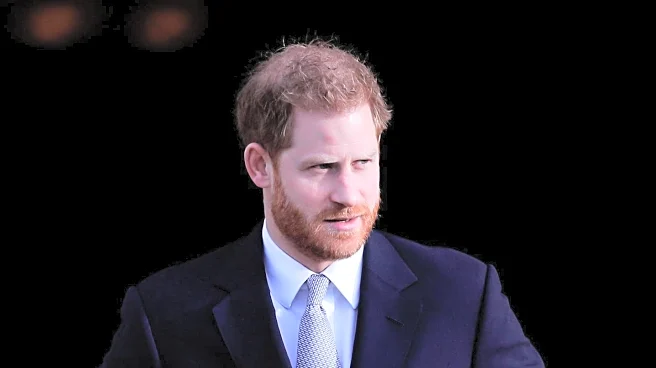What's Happening?
Prince Harry has penned a reflective piece on the significance of Remembrance, emphasizing the collective responsibility to honor those who serve in the military. In his article, he discusses the personal and communal impact of military service, drawing
on his experiences with the Invictus Games and his role as a Global Ambassador. He highlights the resilience and determination of those who have suffered injuries in service, particularly referencing his visit to Ukraine. Prince Harry underscores the importance of supporting military families and veterans, advocating for continued respect and opportunities for those who have served.
Why It's Important?
The article by Prince Harry sheds light on the broader societal obligation to support military personnel and their families. It emphasizes the need for ongoing recognition and support for veterans, which is crucial for their reintegration into civilian life. This perspective is particularly relevant in the U.S., where veteran affairs are a significant public policy issue. The piece also serves to remind the public of the sacrifices made by military families, encouraging a culture of gratitude and support. By advocating for reciprocity, Prince Harry calls for a societal commitment to those who have safeguarded freedoms, which can influence public attitudes and policy towards veterans.
What's Next?
As Remembrance Day approaches, there may be increased public and governmental focus on veteran affairs and military family support. Prince Harry's message could inspire initiatives aimed at improving veteran services and fostering community engagement with military families. Organizations and policymakers might use this opportunity to address gaps in veteran care and support systems, potentially leading to legislative or community-driven actions to enhance the quality of life for veterans and their families.
Beyond the Headlines
Prince Harry's reflections also touch on the cultural aspects of military service, such as camaraderie and humor, which are integral to the British identity. This cultural dimension highlights the universal values of service and sacrifice, transcending national boundaries. The article encourages a deeper understanding of the personal stories behind military service, fostering empathy and connection within communities. This cultural narrative can contribute to a more inclusive and supportive environment for veterans globally.
















